|
|
|
Sort Order |
|
|
|
Items / Page
|
|
|
|
|
|
|
| Srl | Item |
| 1 |
ID:
119961
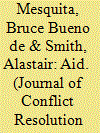

|
|
|
|
|
| Publication |
2013.
|
| Summary/Abstract |
Temporary membership on the United Nations Security Council (UNSC) has pernicious effects on the political and economic development of nations, particularly in nondemocracies. The leaders of rich democratic states often trade resources for the salient policy favors that UNSC members can deliver. This provides the leaders of temporary UNSC members with access to "easy money" resources. Such resources have deleterious consequences, particularly in nondemocracies, because they provide leaders with the means to pay off their coalition of supporters without reliance on tax revenues. While foreign aid is an important form of easy money bribe, it is but one of many. Empirical tests show loans are a substitute means for bribing UNSC members.
|
|
|
|
|
|
|
|
|
|
|
|
|
|
|
|
| 2 |
ID:
148030
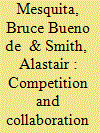

|
|
|
|
|
| Summary/Abstract |
Despite the extensive empirical and theoretical research into foreign aid, there remains little or no formal analysis of aid giving in a competitive donor environment. We endeavor to fill this lacuna with both a model and empirical analysis of aid-for-policy deals with rival aid donors. The model indicates that a dominant donor captures all the surplus from any deal. We test several hypotheses that follow from the model. We demonstrate that the United States paid less (in constant dollars) and gained more in policy terms through aid before the Soviet Union became a significant aid player. Once the Soviet Union became a player in the international aid arena, the United States paid more for aid and got less by way of security concessions from recipients.
|
|
|
|
|
|
|
|
|
|
|
|
|
|
|
|
| 3 |
ID:
065403
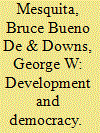

|
|
|
|
|
| Publication |
Sep-Oct 2005.
|
| Summary/Abstract |
Conventional wisdom has long assumed that economic liberalization undermines repressive regimes. Recent events, however, suggest that savvy autocrats have learned how to cut the cord between growth and freedom, enjoying the benefits of the former without the risks of the latter. Washington and international lenders should take note.
|
|
|
|
|
|
|
|
|
|
|
|
|
|
|
|
| 4 |
ID:
142092
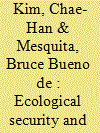

|
|
|
|
|
| Summary/Abstract |
The quality of the ecological environment and security are trans-national and national public goods, respectively. Conceptually, there are three different causal relationships between ecology and security. First, the improvement of security may make the ecological environment better in such cases as détente, followed by environmental cooperation while the degeneration of security deteriorates the ecology in such cases as war. Second, a military confrontation may restore natural ecological systems in such cases as the Korean Demilitarized Zone. Third, ecological cooperation can result in politico-military cooperation while environmental conflict can instigate military conflict. Though the causal path from ecology to security is limited, it needs to be considered as a means to build up security and confidence. A peace park may belong to this category. The Park Geun-hye government has proposed a World Eco-Peace Park to be built inside the Korean DMZ. There is no precedent for the DMZ Peace Park to wholly imitate since no existing peace park was created without some form of prior political and military resolution. The project of the DMZ World Eco-Peace Park should be promoted while considering what facilitates its creation as well as what effect the park will have
|
|
|
|
|
|
|
|
|
|
|
|
|
|
|
|
| 5 |
ID:
076882
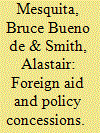

|
|
|
|
|
| Publication |
2007.
|
| Summary/Abstract |
We model foreign-aid-for-policy deals, assuming that leaders want to maximize their time in office. Their actions are shaped by two political institutions, their selectorate and winning coalition. Leaders who depend on a large coalition, a relatively small selectorate, and who extract valuable policy concessions from prospective recipients are likely to give aid. Prospective recipients are likely to get aid if they have few resources, depend on a small coalition and a large selectorate, and the policy concession sought by the donor is not too politically costly. The amount of aid received, if any, increases as the recipient leader's coalition increases, the selectorate decreases, the issue's salience increases, and the domestic resources increase. The theory explains why many Third World people hate the United States and want to live there. Empirical tests using the U.S. Agency for International Development data for the post-World War II years support the model's predictions.
|
|
|
|
|
|
|
|
|
|
|
|
|
|
|
|
| 6 |
ID:
190763
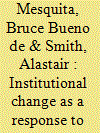

|
|
|
|
|
| Summary/Abstract |
Leaders shift political institutions to ameliorate threats to their tenure. The masses might rebel to replace the leader and change institutions. Disloyalty by political insiders might result in a coup. Leaders liberalize when the masses present a greater threat and ‘autocratize’ to dissipate threats from elites. A two-step procedure tests these arguments: (1) The risks of revolution and coup are estimated as a function of leader health, experience, economic conditions and extant institutions. (2) These risks are used to predict institutional change in a heteroskedastic regression model. The magnitude and direction of institutional change depends upon whether the masses or elites pose the greater threat. When both risks are high, leaders must gamble as to which risk they believe is greatest. In such circumstances, institutions are highly volatile even as the aggregate direction of change becomes unclear.
|
|
|
|
|
|
|
|
|
|
|
|
|
|
|
|
| 7 |
ID:
073978
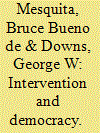

|
|
|
|
|
| Publication |
2006.
|
| Summary/Abstract |
Recent events have raised questions about the extent to which military intervention promotes democracy and the degree to which this depends on the nature of the intervener. We argue that traction on these issues is best obtained by focusing on the policies of the target state that have the greatest implications for the political survival of the intervening state's leader and the kind of governmental institutions in the target state that are most likely to produce them. This perspective generally-although not always-predicts that third-party military intervention in civil wars, other intra- or interstate disputes and wars will lead to little if any improvement, and all too often erosion in the trajectory of democratic development. Three hypotheses on the impact of third-party intervention by democracies, autocracies, and the United Nations are then tested and strongly supported against a counterfactual expectation of what the democratic trajectory would have been in the absence of intervention.
|
|
|
|
|
|
|
|
|
|
|
|
|
|
|
|
| 8 |
ID:
100281
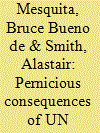

|
|
|
|
|
| Publication |
2010.
|
| Summary/Abstract |
ations elected to the United Nations Security Council (UNSC) as temporary members have lower levels of economic growth, become less democratic, and experience more restrictions on press freedoms than comparable nations not elected to the UNSC. Using regression and matching techniques the authors show, for instance, that over the two-year period of UNSC membership and the following two years during which a nation is ineligible for reelection, UNSC nations experience a 3.5 percent contraction in their economy relative to nations not elected to the UNSC. The detrimental effects of UNSC membership are strongest in nondemocratic nations. The authors contrast these results with the growing evidence that nations elected to the UNSC receive greater development assistance.
|
|
|
|
|
|
|
|
|
|
|
|
|
|
|
|
| 9 |
ID:
152410
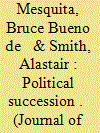

|
|
|
|
|
| Summary/Abstract |
In addition to everyday political threats, leaders risk removal from office through coups and mass movements such as rebellion. Further, all leaders face threats from shocks such as downturns in their health, their country’s economy, or their government’s revenue. By integrating these risks into the selectorate theory, we characterize the conditions under which each threat is pertinent and the countermoves (purges, democratization, expansion of public goods, and expansion of private benefits) that best enable the leader to survive in office. The model identifies new insights into the nature of assassins; the relative risk of different types of leader removal as a function of the extant institutions of government; and the endogenous factors driving better or worse public policy and decisions to democratize or become more autocratic. Importantly, the results highlight how an increase in the risk of deposition via one means intensifies other removal risks.
|
|
|
|
|
|
|
|
|
|
|
|
|
|
|
|
| 10 |
ID:
091469
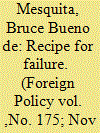

|
|
|
|
|
| Publication |
2009.
|
| Summary/Abstract |
Want to know what's going to happen with climate change? Is the world going to come together this Dcember at the Copenhagen summit or at some future date, and regulate away enough of the Greenhouse gases that are heating up the planet to warm Al Gore's heart?
|
|
|
|
|
|
|
|
|
|
|
|
|
|
|
|
| 11 |
ID:
036837
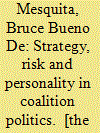

|
|
|
|
|
| Publication |
Cambridge, Cambride University press, 1975.
|
| Description |
ix,198p.
|
| Standard Number |
0521208742
|
|
|
|
|
|
|
|
|
|
|
|
Copies: C:1/I:0,R:0,Q:0
Circulation
| Accession# | Call# | Current Location | Status | Policy | Location |
| 028573 | 324.254/DDc 20 MES 028573 | Main | On Shelf | General | |
|
|
|
|
| 12 |
ID:
057994
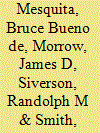

|
|
|
|
|
|
|
|